May 31, 2025 | 02:25 GMT +7
May 31, 2025 | 02:25 GMT +7
Hotline: 0913.378.918
May 31, 2025 | 02:25 GMT +7
Hotline: 0913.378.918
On December 2, MARD and the Provincial People's Committee of Phu Yen co-hosted the Conference on "Promoting the Seaweed Industry: Tasks and Solutions." MARD Deputy Minister Phung Duc Tien presided over the event, which was attended by hundreds of delegates from affiliated units, companies, and government agencies in coastal provinces around the nation.
According to the Directorate of Fisheries (D-Fish), seaweed's function and potential have been specified since 2013 and included in the Strategy for the growth of the fishing sector, as well as plans and schemes for the period 2021-2030. MARD, institutions, and coastal provinces are responsible for promoting the sustainable growth of the seaweed sector through research and model creation.
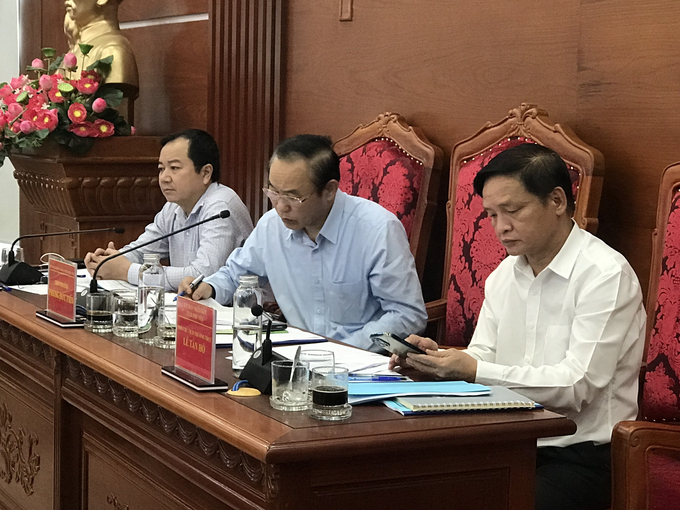
Deputy Minister of Agriculture and Rural Development Phung Duc Tien chaired the conference. Photo: V.D.T.
Since 2013, MARD has sent out eight scientific and technology missions to study and cultivate seaweed. Investigating and evaluating potential objects to produce, store, and propagate seaweed, completing the process of cultivating seaweed, constructing a model of developing seaweed in conjunction with black tiger shrimp farming, planting and recovering seaweed, and processing seaweed are among the topics and projects covered.
MARD is partnering with the Ministry of Science and Technology to conserve genetic resources and conduct research, as well as create seaweed varieties, as part of the Development Program on research and seed production for agricultural restructuring in the period 2021-2025.
The National Center for Agricultural Extension has also coordinated with the Aquaculture Research Institute III and the Agricultural Extension Centers of Khanh Hoa, Ninh Thuan, Thua Thien - Hue and Quang Binh provinces to implement a model of combining black tiger shrimp and snail farming, sea cucumber with seaweed, achieved some results, and assisted households in participating in the profit-generating model.
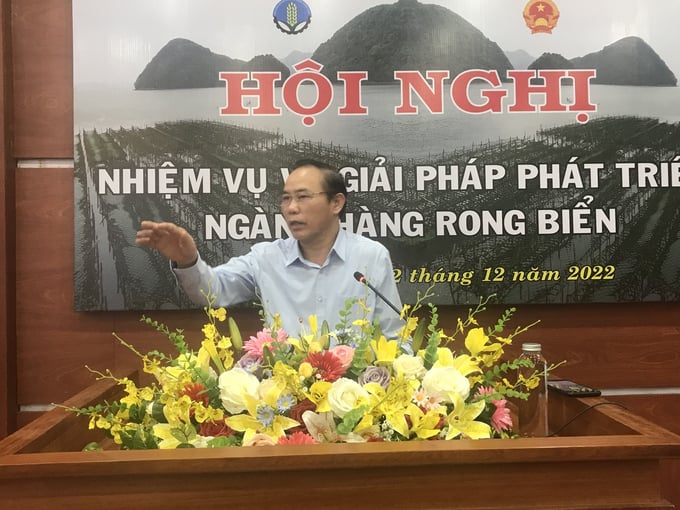
Deputy Minister of Agriculture and Rural Development Phung Duc Tien delivered at the conference. Photo: V.D.T.
Some areas have also conducted seaweed-related tasks and scientific research initiatives. Khanh Hoa, for instance, carries out the responsibilities of the provincial genetic resource conservation framework project from 2021 to 2025, with an emphasis on conservation, storage, and direction for the use and development of valuable seaweed species. Khanh Hoa also coordinates with the World Wide Fund (WWF) to build a sustainable seaweed chain project, a GEF project in Vietnam from 2022 to 2026.
Priority is being given to the development of several large-scale seaweed farming models in appropriate water areas in the province of Binh Thuan's plan to expand marine aquaculture through 2030 with a view to 2045.
The Phu Yen Agricultural Seed Center executes a program for the cultivation of seaweed tissue, maintains around 500,000 seed tissues, conducts commercial trials of cartilaginous seaweed in the open sea at the Aquaculture Breeding Station, and harvests approximately 20 tons of seaweed.
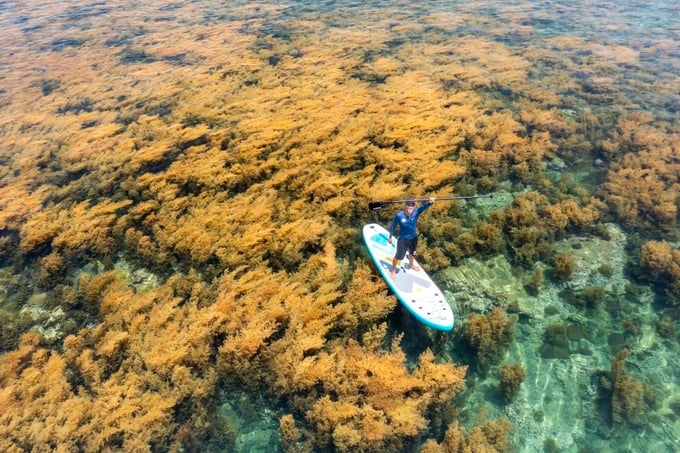
The potential for seaweed development in Vietnam is huge. Photo: V.D.T.
Mr. Tran Dinh Luan, director of D-Fish, stated that the strategy for fisheries development targeted reducing exploitation and shifting from fishing to farming for numerous items, including shrimp, fish, and seaweed, which are in high demand locally and internationally.
It is feasible for the fishing sector to improve seaweed cultivation. The central region's extensive coastline, water potential, and natural circumstances are very favorable to the production of high-demand seaweed products such as the Indonesian edible red seaweed and sea grapes.
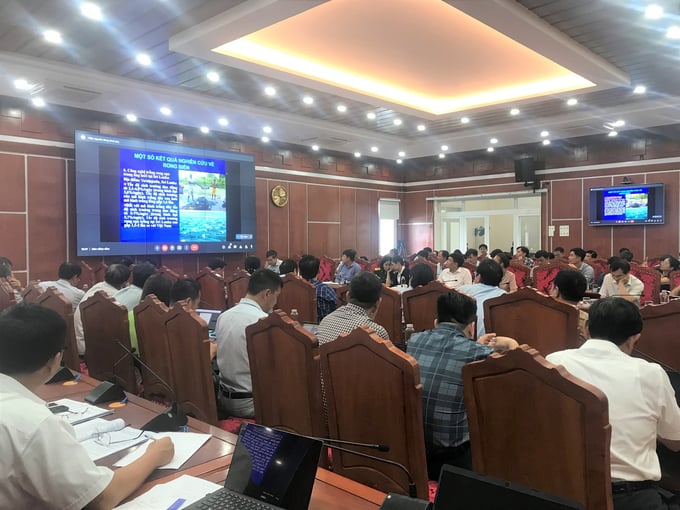
Hundreds of delegates attended the conference. Photo: V.D.T.
"The cultivation of seaweed in Vietnam is relatively young. For the industry to flourish sustainably in the future, we must do research and choose high-quality seeds for a variety of applications, including food and medicine. The planting method must be standardized to maximize yield, save planting time, and fulfill export standards ", stated Mr. Tran Dinh Luan.
With the present demand, research and processing investments must be increased, particularly for pharmaceutical and medical items. Researchers and entrepreneurs must collaborate to develop significant goods for the Vietnamese seaweed sector.
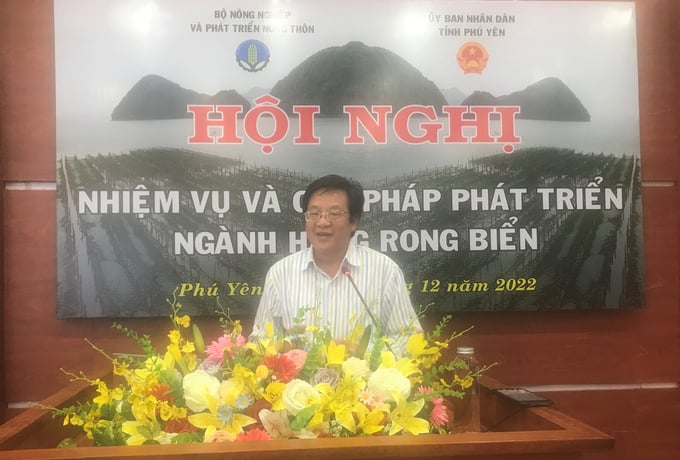
Mr. Ngo Dang Nghia (University of Nha Trang) delivered at the conference. Photo: V.D.T.
Many conference attendees were most concerned about seeds, followed by the challenge of transferring technology to seaweed producers. The key to the success or failure of the seaweed sector is the cultivation technique.
According to Deputy Minister of Agriculture and Rural Development Phung Duc Tien, we should consider exporting processed seaweed goods when we have excellent seeds, growing areas, proper manufacturing techniques, and processing facilities.
"In modern aquaculture, seaweed farming does not require feeding, so there is no need to worry about high or low prices for aqua feed," said Deputy Minister Phung Duc Tien said, adding that investing in the seed stage would provide a steady and long-term income.
"We assigned the D-Fish with providing the MARD with a comprehensive program to boost the seaweed business by January 2023. It is necessary to define seaweed as a potential object in order to establish suitable development strategies. When creating new products, firms must invest in processing plant facilities and broaden their customer base. On the basis of the plan, the functional sector must seize the development space by mobilizing all resources from scientists, agricultural extension agents, and markets. Localities must foster a conducive environment, particularly via provincial planning. We can only support the growth of seaweed in the near future if we convey to the public that the demand for seaweed is extremely strong ", directed Mr. Phung Duc Tien, Deputy Minister of Agriculture and Rural Development.
Translated by Linh Linh

(VAN) Vaccinating juvenile pangasius helps reduce disease, antibiotic use, and farming costs, increasing profits for export-oriented farmers in An Giang.

(VAN) Due to a limited supply of workforce and competitive recruitment requirements, businesses struggle to retain talented veterinary human resources.

(VAN) WOAH’s guidance aims to mitigate disease risks through a One Health approach that balances economic, conservation, and public health interests.

(VAN) Ms. Nguyen Thi Dung, Deputy Director of Ngoc Hoang Cooperative, shared about the journey of bringing dragon fruit to Europe, achieving annual revenues in the billions of VND.

(VAN) Bamboo products from Thang Tho Bamboo Cooperative have reached many countries around the world, while also creating jobs for local workers.

(VAN) The Management Board of Con Dao National Park reported that a green sea turtle, tagged in the Philippines, has traveled thousands of kilometers to lay 84 eggs on Bay Canh Islet.

(VAN) Green technology is paving a new path for sustainable aquaculture in the Mekong Delta in particular and across the country in general, helping reduce emissions and adapt to climate change.